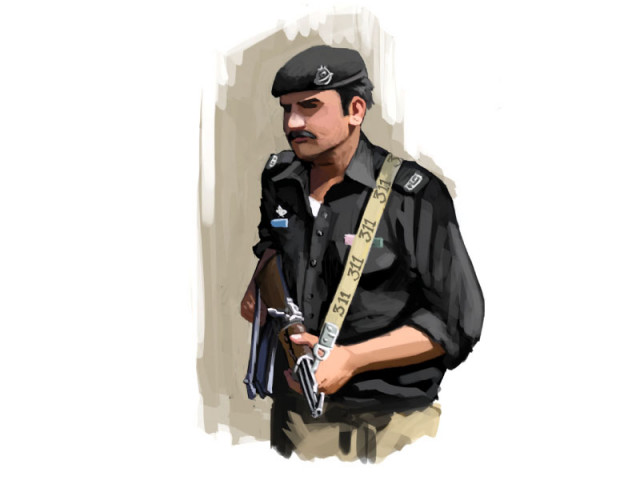Inside job: Those who snitch get rich
Police and criminals use each other's people as informants to stay a step ahead .

The same strategy is used by the criminals, only they find their informants in the police force. ILLUSTRATION: JAMAL KHURSHID
Networking is an important part of almost every profession, and for the law enforcers in Karachi, it pays off in the form of putting criminals behind bars.
The Karachi police have built its own network of informers who point them in the direction of targeted killers, extortionists and kidnappers. Known as 'mukhbir', 'mukhbir-e-khas' or 'khabri' in police terminology, they are the key players who have been assisting the police in the ongoing targeted operation. Most of them, according to officials, are known criminals but are considered 'good people'.

The information they provide is crucial in making or breaking a case, especially the big ones, said senior police official, Chaudhry Aslam. "To be a good officer and do your job well, you must have a good network of informers," he told The Express Tribune.
The job of the informer, however, is a risky one - around 250 police informants have been killed in the city since the 1990s. "It is a game of trust. If the police officer and the informant do not trust each other, they won't be able to work together," said an informant on the condition of anonymity. "The nature of our job is dangerous, as one minor mistake could cost us our life."
Money talks
The informants are paid according to the value of their information. But at times, the information is partial or incorrect and lead to a dead end. This is one of the reasons the policemen often choose to pay the informants out of their own pockets even though the department has a separate budget for the purpose. "If we fail to crack the case despite paying the informant, then our seniors snub us. It is better to initially pay yourself and then claim the amount from the department," said a senior police official. Every year, the Sindh government allocates between Rs100 million to Rs120 million to the police for this purpose but according to relevant officials, the amount usually exceeds the budget.

"The allocated amount is usually spent by the end of the fiscal year," former chief of Sindh police's finance department, Dost Ali Baloch, told The Express Tribune. "Sometimes we even exceed the amount which is an indication of how much the department relies on informers."
Informants are commonly found in the world of organised crime and have to be given enough incentives to snitch on their own. "First, you have to do something good for them," explained Chaudhry Aslam. "In some cases, we release the criminals accused of minor crimes in return for their help in catching the bigger fish. Sometimes we even pay double the estimated amount and later train them."
The police also get their information from paan wallahs, cobblers, watchmen, shopkeepers and rival group members. Their motivation, however, is not money. It is either to help eliminate crime or to hurt their enemies.
Two can play this game
The same strategy is used by the criminals, only they find their informants in the police force. "We [criminals] have the same tactics," said a member of a criminal gang in Karachi, while referring to the kidnapping and murder of Lyari's notorious gangster Arshad Pappu in which several policemen were implicated. "It's all about money. Money does not see who is a police wallah or who is a criminal."
Gangs and criminals also have a network of youngsters who act as spies for them in different parts of the city, especially the no-go areas. "They give us a cell phone and Rs500 to Rs1,000 per month," said a 13-year-old boy who lives in Sohrab Goth. "Our job is only to keep an eye on the law enforcers' movement and let the criminals know."
Published in The Express Tribune, October 8th, 2013.


1724319076-0/Untitled-design-(5)1724319076-0-208x130.webp)
















COMMENTS
Comments are moderated and generally will be posted if they are on-topic and not abusive.
For more information, please see our Comments FAQ